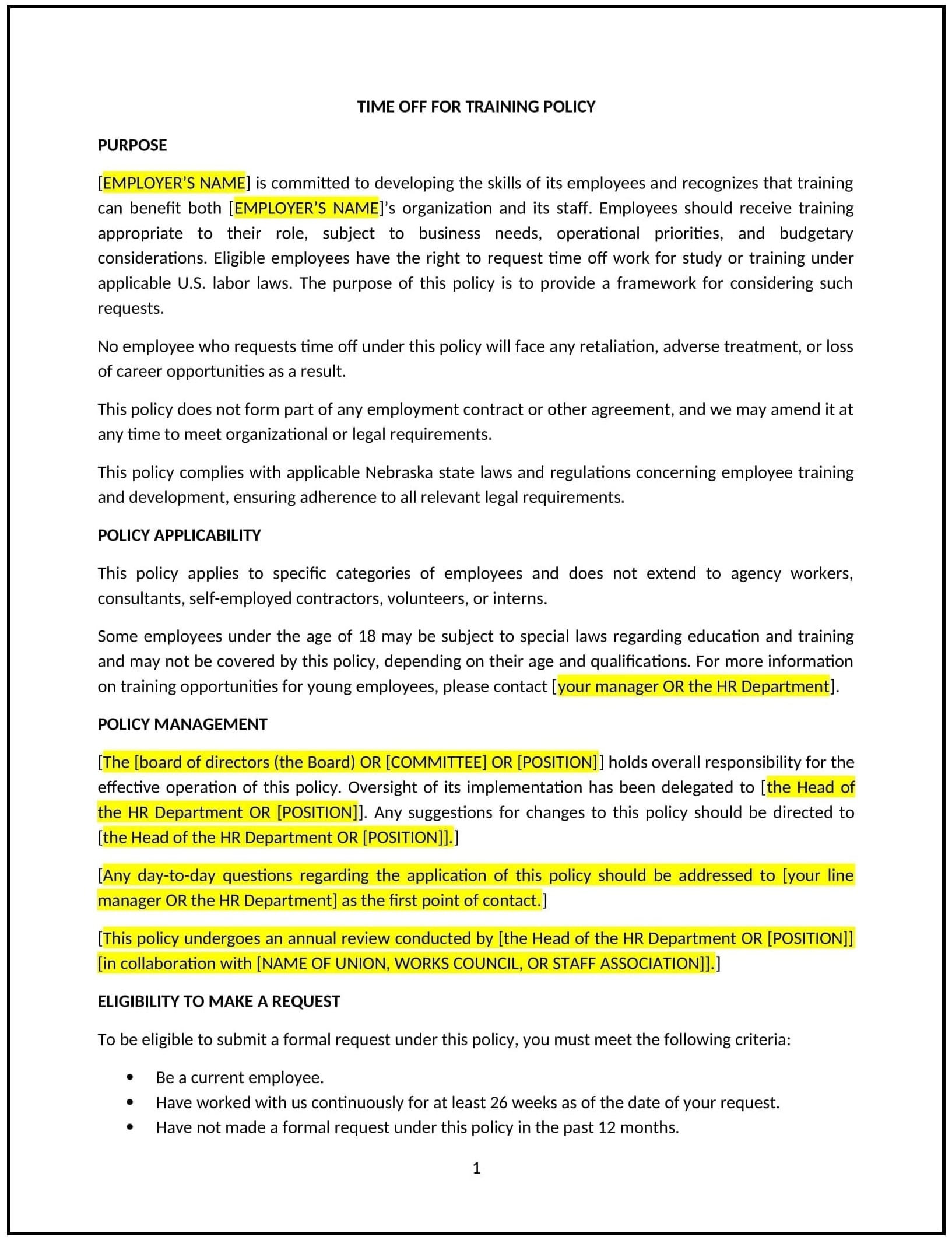Time off for training policy (Nebraska): Free template
Got contracts to review? While you're here for policies, let Cobrief make contract review effortless—start your free review now.

Customize this template for free
Time off for training policy (Nebraska)
A time off for training policy helps Nebraska businesses support employees in acquiring new skills or certifications that are beneficial to both their personal development and the organization. This policy outlines how employees can request time off for training, the approval process, and any requirements for reimbursing training costs. It is designed to promote continuous learning, improve employee performance, and enhance the company’s overall capabilities.
By adopting this policy, businesses in Nebraska can invest in employee growth while ensuring that time away from work for training is managed efficiently and equitably.
How to use this time off for training policy (Nebraska)
- Define eligible training: Specify what types of training are eligible for time off, such as job-specific courses, professional development programs, industry certifications, or educational seminars. Ensure that the training aligns with the employee’s role and the company’s strategic goals.
- Establish approval procedures: Outline the process for employees to request time off for training, including how far in advance requests should be submitted and what information is needed (e.g., course details, duration, costs). Specify who is responsible for reviewing and approving these requests.
- Clarify paid vs. unpaid leave: Define whether time off for training is paid or unpaid. If paid time off is provided, include the criteria under which it applies (e.g., for job-related courses or certifications). If the training is unpaid, employees may use vacation or PTO for this purpose.
- Set training duration limits: Specify any limits on the amount of time an employee can take off for training, such as a maximum number of days per year or a specific cap per course. This helps ensure that training time does not unduly disrupt business operations.
- Address reimbursement for training costs: Clarify whether the company will reimburse employees for the costs of training programs, including tuition, course materials, or travel expenses. The policy should outline the circumstances under which reimbursement is provided and any limits on the amounts.
- Track training completion: Employees should be required to submit proof of training completion, such as a certificate or attendance verification, to ensure that the training was completed successfully and aligns with the company’s objectives.
- Maintain operational continuity: Specify that employees requesting time off for training should plan ahead to ensure that their workload is managed during their absence. This may include collaborating with colleagues to cover duties or completing certain tasks before taking time off.
- Review and update: Periodically review and update the policy to ensure it remains aligned with business needs, employee feedback, and Nebraska state regulations regarding time off and training.
Benefits of using this time off for training policy (Nebraska)
This policy provides several benefits for Nebraska businesses:
- Improves employee skills: By offering time off for training, businesses help employees develop the skills needed to perform their jobs more effectively, contributing to overall business success.
- Increases employee engagement and retention: Providing opportunities for professional growth can improve job satisfaction, reduce turnover, and increase employee loyalty.
- Boosts organizational performance: Training enhances the company’s capacity to meet challenges, innovate, and adapt to industry changes, resulting in improved business performance.
- Fosters a learning culture: The policy encourages continuous learning and development, which is crucial for staying competitive and fostering a growth-oriented workplace culture.
- Ensures equitable access to training: A structured policy ensures that all employees have an equal opportunity to request and take time off for training, promoting fairness across the organization.
Tips for using this time off for training policy (Nebraska)
- Communicate the policy clearly: Ensure all employees are aware of the time off for training policy, including the steps for requesting time off, how to submit training costs for reimbursement, and any limits on training days. Include the policy in employee handbooks and during onboarding.
- Plan ahead for training requests: Encourage employees to submit requests for training well in advance to allow for proper scheduling and to ensure business continuity. This can help minimize disruption and allow managers to plan for their absence.
- Offer a variety of training options: Provide employees with a range of training opportunities that align with their career goals and the company’s needs, whether they are formal certifications or on-the-job development programs.
- Track training participation and effectiveness: Monitor employee participation in training programs and assess the effectiveness of training in improving job performance. Gather feedback from employees on the training experience to identify any improvements or changes needed.
- Stay flexible when needed: While the policy should set clear guidelines, be flexible when circumstances require, such as offering additional training time for employees pursuing advanced certifications or attending essential industry conferences.